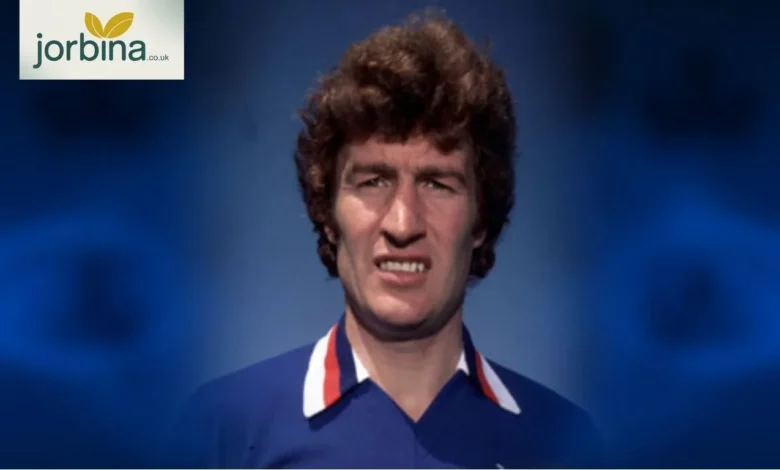How Sandy Jardine Became the Heart of Rangers Football

A Legend That Still Feels Alive
What makes some players unforgettable while others fade into history? Maybe it’s a skill. Maybe it’s the heart. In Sandy Jardine’s case, it was both. He wasn’t just another footballer who came and went through Ibrox; he was the kind of player who left a lasting mark on everyone who watched him play. His story is one of quiet strength, loyalty, and a lifelong bond with Rangers Football Club that went far beyond goals and trophies.
Early Life and First Steps into Football
Alexander “Sandy” Jardine was born in Edinburgh in 1948. Like so many young Scottish boys, he grew up chasing a football on cobbled streets, dreaming about wearing the blue of Rangers. Football wasn’t just a pastime for him; it was a calling. His dedication showed early, and it wasn’t long before his talent caught the attention of scouts.
By the mid-1960s, Sandy was part of the Rangers. He didn’t arrive with fanfare or ego, just determination. From the start, coaches could see that he had something rare. He wasn’t just technically sound; he had a calm understanding of the game that made him stand out even among older players.
Rising Through the Ranks at Rangers
When he broke into the first team, Rangers already had a strong core of players. Names like John Greig, Willie Johnston, and Peter McCloy defined the club’s era. Even in that company, Sandy managed to shine. At first, he played further up the pitch, but coaches soon realized he had the vision and intelligence for a defensive role. That shift to right-back would become one of the most defining moments of his career.
He redefined what it meant to be a full-back. Sandy wasn’t content to stay deep and clear balls; he drove forward, creating opportunities and linking defense with attack. It was his timing, positioning, and composure that made him invaluable. Fans came to trust him not just to defend but to lead from the back.
Building Glory at Ibrox
Sandy Jardine was at the heart of Rangers’ heyday in the early 1970s. His greatest moment occurred in 1972 when Rangers won the European Cup Winners’ Cup, which is still regarded as one of the club’s greatest triumphs. Every Rangers fan still talks about the triumphant moment from the Barcelona final.
Sandy was essential to that accomplishment. Rangers overcame seemingly insurmountable obstacles thanks to his command of the game, ability to cover ground, and leadership under duress. His status as one of the club’s all-time greats was solidified that evening.
Playing Among Giants
Legends abound at Rangers during Sandy’s tenure, including the fearless captain John Greig, the inventive winger Willie Johnston, the goal scorer Derek Johnstone, and the reliable custodian Peter McCloy. They were a brotherhood, not just teammates. With her quiet steadiness that balanced their personalities, Sandy was a perfect fit for that group.
His teammates still referred to him as the ultimate professional years later. He wasn’t ostentatious or noisy. He wasn’t looking for attention. But everyone turned to him when the game got tough. He set an example for others to follow by being calm and focused.
The Definition of Loyalty
Sandy Jardine played more than 600 matches for Rangers, a number that reflects not just skill but commitment. His loyalty never wavered. For him, Rangers wasn’t a stepping stone; it was home. In an era before transfers and money ruled football, Sandy showed what it meant to be truly devoted to a club.
When he left Rangers in 1982, he didn’t retire. He joined Heart of Midlothian (Hearts) to continue doing what he loved most, playing football. Even there, his class showed. Fans respected him not just as a Rangers legend but as a true ambassador for Scottish football.
The Gentleman of the Game
Sandy Jardine was unique not just because of his skills but also because of his character. He was respected by opponents as well as teammates and supporters. He exuded a certain dignity. He didn’t yell or startle. He allowed his football to do the talking.
He always made time to greet fans after games. He was respectful to everyone, whether he was signing autographs or discussing the game. He was even more adored by others because of his humility. Off the pitch, he exuded the same poise that he displayed on it.
Staying Close to Rangers
When his playing days ended, Sandy didn’t walk away from football. He stayed connected to Rangers, taking up roles that allowed him to represent the club in different ways. From media duties to public relations and ambassadorial positions, he remained a key figure at Ibrox.
Even during difficult periods for the club, he never distanced himself. When Rangers faced financial troubles and fell to the lower divisions, Sandy stood strong. He reminded supporters of what Rangers stood for: resilience, belief, and loyalty. His leadership during that time helped unite the fanbase when it mattered most.
The Final Battle
Sandy declared in 2013 that he was suffering from cancer. His strength astounded people even back then. He refused to let his illness define him, still going to games and speaking for the team. Everyone who heard his story was inspired by his bravery.
In 2014, tributes poured in from all over Scotland and beyond after his death. Journalists, rival supporters, and former teammates all acknowledged his class and dignity. He embodied the finest qualities of football and was more than just a player.
The Sandy Jardine Stand

Rangers changed the name of the West Stand at Ibrox to the Sandy Jardine Stand in remembrance of him. Everyone felt that the choice was the right one. Fans stood in a sea of blue to show their love and gratitude, and his wife, Shona Jardine, attended the dedication ceremony.
His presence feels close each time supporters occupy that stand. The chants, the pride, the emotion, all of it carries a little of Sandy’s spirit. It represents everything he meant to the club and is more than just a name on a wall.
Remembering His Legacy
Sandy’s legacy lives on not just in the memories of those who saw him play but in the values he left behind. He showed that football could be played with honor and heart. Every story told about him, whether from a fan or a teammate, carries warmth and respect.
You can still feel his influence around the club. His attitude toward professionalism and teamwork continues to shape new generations. Rangers may have changed over the years, but the values Sandy stood for remain part of its identity.
Lessons That Last
There’s something timeless about Sandy Jardine’s story. He proved that success doesn’t need arrogance and that true greatness comes from consistency and integrity. He played every game as if it mattered because, to him, it did.
When fans talk about the old days, his name always comes up. They remember his powerful runs down the right flank, his precise tackles, and the way he read the game better than anyone. But above all, they remember his decency.
The Connection Between Jardine and Rangers
Rangers and Sandy Jardine were inseparable. He gave everything to the club, and in return, the club and its fans gave him their hearts. When he spoke about Rangers, you could hear pride in his voice. He believed in what the badge stood for.
His bond with figures like John Greig showed that football isn’t just about competition; it’s about brotherhood. They shared the highs of victory and the lows of defeat, always with mutual respect. That friendship was built on shared values that still define Rangers today.
Why Sandy Jardine Still Matters

There are a few players whose influence stretches beyond their lifetime. Sandy Jardine is one of them. His approach to football, calm, intelligent, and composed, still serves as an example for modern players. Fans continue to honor him not out of nostalgia but out of genuine admiration.
When supporters walk into Ibrox and glance at the Sandy Jardine Stand, they don’t just see a tribute. They see a reminder of what Rangers stands for: commitment, loyalty, and pride.
The Broader Impact of Loyalty and Dedication
Stories like Sandy’s remind us that real success comes from values, not just victories. His devotion to his team mirrors how loyalty still holds power in any field. Whether in sports or life, staying true to what matters makes the biggest difference.
If you’re looking to explore more about values like commitment and leadership, visit Jorbina, a platform that often dives into inspiring stories and lessons that connect beyond the pitch. For those interested in how dedication translates into business resilience, you can also check out Want Better Coverage? See what Jardine Lloyd Thompson Dubai offers first for insights into professional integrity and performance at a global level.
A Legacy That Will Never Fade
Sandy Jardine will always be remembered as one of the Rangers’ finest. He gave everything to the club, led with quiet strength, and never compromised his values. The man who once ran tirelessly down the right side of Ibrox became a symbol of pride that endures long after his final match.
He wasn’t just the heart of Rangers football, he was its soul. His story reminds every fan why they fell in love with the game in the first place.
FAQs
How good was Sandy Jardine?
Sandy Jardine was one of Scotland’s best defenders. He was known for his intelligence, positioning, and the rare ability to blend defensive discipline with attacking creativity. His consistency made him one of the top full-backs of his generation.
Who did Sandy Jardine play for?
He played mainly for Rangers, where he became a legend, and later for Heart of Midlothian (Hearts), earning admiration from fans of both clubs.
What was Sandy Jardine’s best position?
He excelled as a right-back, a position that allowed him to influence both defence and attack. His overlapping runs and accurate passing set a new standard for the role.
Where is the Sandy Jardine Stand?
The Sandy Jardine Stand is honored at Ibrox Stadium in Glasgow, home of Rangers Football Club. It was renamed in his honor following his passing in 2014.
Who did George Best play for in the country?
George Best represented Northern Ireland. Although he never played in a World Cup, his talent earned him recognition as one of football’s all-time greats, respected even by peers like Sandy Jardine.



